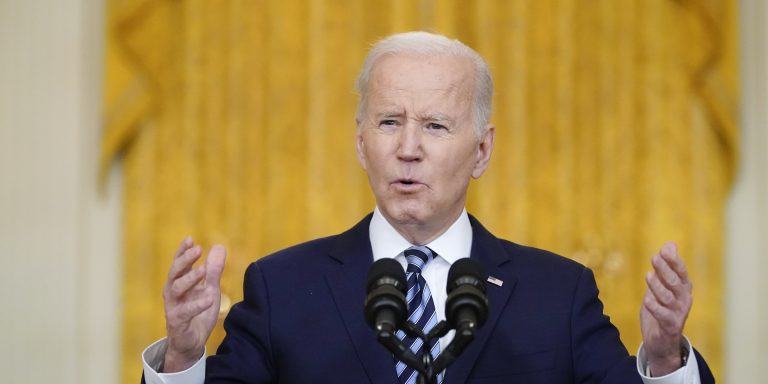INTELBRIEF
February 25, 2022
IntelBrief: Biden Announces Severe Sanctions on Russia for Ukraine Invasion

Bottom Line Up Front:
- Yesterday, U.S. President Biden condemned Russia’s invasion of Ukraine and announced a new tranche of sanctions that target Russian elites, top banks and state-owned enterprises, and technology exports to Russia.
- Russia’s invasion of Ukraine has been met with wide international condemnation as Western countries work on a unified response to include severe economic sanctions and ensure NATO’s readiness.
- Putin warned other countries that any attempt to interfere with Russia’s operation would result in “consequences they have never seen,” a statement many observers considered a veiled nuclear threat.
- Continued military operations are likely to result in a refugee and humanitarian crisis in Eastern Europe as Ukrainians flee to neighboring countries, especially Poland.
“Putin chose this war, and now he and his country will bear the consequences,” U.S. President Joseph Biden asserted yesterday afternoon in a speech condemning Russia’s invasion of Ukraine. Biden announced a new tranche of sanctions that target Russian elites, top banks and state-owned enterprises, and technology exports to Russia. He emphasized that the coalition of partners aligned on the response to Russia represents over half of the global economy. He now turns to steps to protect NATO allies, including a summit today to map out steps “to strengthen all aspects of our NATO alliance.” But while U.S. troops have deployed to NATO’s eastern flank and additional troops will deploy to Germany, Biden makes it clear that the U.S. military will not be fighting in Ukraine.
Russian President Vladimir Putin’s announcement of a “special military operation” against Ukraine on February 23 signaled the commencement of Russia’s invasion of the country. Following an extraordinary session of the UN Security Council on the 23rd, it is expected that the U.S. and its allies will put forward a resolution condemning Russian action. Notwithstanding the anticipated Russian veto and possibly Chinese abstention, the resolution will likely aim to politically isolate Russia and could create pathways for further actions. Although the Ukrainian call for Russia’s expulsion is not likely to deliver results in the Council, it could potentially lead to a process in the General Assembly challenging the Russian Federation’s assumption of the former Soviet Union’s seat in 1991. Soon after Putin’s announcement, Ukraine’s President Volodymyr Zelenskyy delivered a national address announcing Russia’s strikes on military sites and border posts and introducing martial law across the country. Moscow’s actions have been met with international condemnation as Western countries work on implementing a unified response—including more severe economic sanctions intended to progressively shift Putin’s calculus in Ukraine—and ensure NATO’s resilience and readiness on the Alliance’s eastern flank.
Emergency meetings have been held and/or planned at the multilateral level among NATO, EU, UN, and G7 members. Putin’s latest moves follow his decision to recognize the Donetsk People’s Republic and Luhansk People’s Republic on February 21 and the signing of mutual cooperation agreements between Russia and the two breakaway regions. Russia’s actions come on the heels of months of escalation and planning along Ukraine’s borders, where Russia positioned nearly 190,000 troops while also conducting military exercises in neighboring Belarus. Putin also warned other countries that any attempt to interfere with Russia’s operation would result in “consequences they have never seen.” Many observers have considered this a veiled nuclear threat.
Continued military operations are likely to result in a refugee crisis in Eastern Europe as Ukrainians flee to neighboring countries, especially Poland. American officials have estimated that a nationwide attack on Ukraine could result in between one million to five million refugees, largely centered in Poland. The Ukraine-Poland border is open, and Poland is preparing to host refugees from Ukraine, the Polish interior minister said. A host of countries with Russian minorities are raising concerns of a “Donbas problem,” that Russia will use the same false pretenses against them because of minority Russian-speaking populations. Concerns have been raised in Moldova, as well as in all three Baltic countries (Estonia, Latvia, and Lithuania—also NATO members) which have ethnic Russian minorities; in Latvia and Estonia, these communities make up about one-quarter of the population. In Europe, as elsewhere, such rhetoric in Russia’s statements and the possibility of additional “Donbas problems” hearkens back to the worst periods of war and conflict in the twentieth century.
The conflict currently playing out in Ukraine also risks influencing future crises around the world, as U.S. adversaries exploit gaps in alliances and influence for their own strategic objectives. Russia’s actions represent a clear and present danger to the rules-based international order and the multilateral system, with several UN member states highlighting that this was an unprovoked and aggressive action with severe consequences for civilians. Moreover, states that are usually vociferous defenders of the principles of sovereignty, territorial integrity, and non-intervention have been restrained, highlighting the chasm between states determined to challenge Russia’s actions as colonialist expansions and those unwilling to risk economic and political benefits from the relationship.
As one manifestation, Western allies have highlighted risks of disinformation and propaganda campaigns designed to obfuscate information and break Ukrainian and NATO morale. Russian-backed and aligned online actors are being echoed and likely supported by China and even state-owned media in China. Specifically, there has been a spike in disinformation peddling anti-NATO and anti-U.S. sentiments.?Historically, China has learned from Russian disinformation campaigns and tailored Russian tactics to fit Beijing’s playbook. Disinformation narratives that are explicitly anti-U.S. and anti-U.S. multilateralism may be adopted and adapted to influence sentiments in the Indo-Pacific theater in the future. Taiwanese officials are understandably nervous that Beijing may take advantage of a distracted West to ramp up pressure on Taipei amid the crisis in Ukraine—particularly at a time that the principle of self-determination and sovereignty is under assault. Now, the world awaits the verdict on whether sanctions will be enough to curtail Putin’s ambitions and limit the civilian and democratic impact in Ukraine.